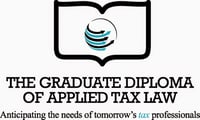As students begin the search for grad positions and employers start sifting through countless CVs, we took the opportunity to sit down with Martin Booth, partner at Moore Stephens Sydney, to talk about his ideal candidate.
We expect both cadets and graduates to do The Tax Institute’s CTA1 and CTA2 courses at Moore Stephens Sydney and, when it’s introduced, we’ll also be encouraging them to undertake the Graduate Diploma of Applied Tax Law.
We’ve always found The Tax Institute’s tax training a win-win for both the partners and its employees. At university, people will often only do one tax subject, which only covers some very basic legal concepts. And if my experience is anything to go by, it goes in one ear and out the other as soon as exams are over.
I’ve got a Master’s of Taxation degree, so I think I’m in a good position to draw a comparison between lawyers and accountants. What I like about The Tax Institute’s courses are that they’re more focused on the legal rather than accounting end of the spectrum, yet they have a practical focus.
The CTA1 provides an opportunity for all the important concepts to be encountered several times and truly understood. Certainly, once employees have finished the CTA1, they’re able to undertake basic compliance jobs and pump out FBT, BAS and tax returns a lot quicker and with less supervision.
If the CTA1 teaches our staff how to be competent bookkeepers, the CTA2 and CTA3 teach them how to become advisors. Once they’ve done those more advanced tax courses, staff can move into a proprietary role, they can identify the issues and they can provide helpful solutions. I describe it as being able to create history rather than just recreating it – by which I mean instead of just taking data and turning it into a set of financials, you’re using that data to identify current or potential issues the client is facing.
Gen Y employees are typically keen to advance their careers quickly, and doing a tax training course allows them to do just that, as well as giving them a chance to learn from experienced lawyers and accountants who are at the coalface rather than from academics in educational institutions. Plus, it’s a great opportunity to network with like-minded people and make friends – I know I still catch up with people I’ve done different forms of tax training with over the years.
In terms of the financial return to Moore Stephens Sydney of outsourcing this taxation education, while we could have senior staff running internal training programs, it’s not a profitable use of their time. And the return we get on a taxation course means it more than pays for itself several times over. If you spend around $1000 putting a cadet or graduate through the CTA1, you can expect that to improve their efficiency to the point where they are generating an additional $6000 a year in revenue.
Our intention is to have staff, at the appropriate stage of their professional development, undertake the Graduate Diploma of Applied Tax Law. There’s a gap in the market between the CA program and Master of Taxation, so I think there is a need for a simplified postgraduate tax course.
– Martin Booth, partner at Moore Stephens Sydney

Enrolments for the Graduate Diploma of Applied Tax Law subjects for Study Period 1 in 2015 are now open.However, if you want to get started in 2014 the subjects CTA1 Foundations, and CTA2A Advanced are currently open for enrolments for Study Period 3 2014.
Find out more, and enrol, at taxinstitute.com.au/education.








